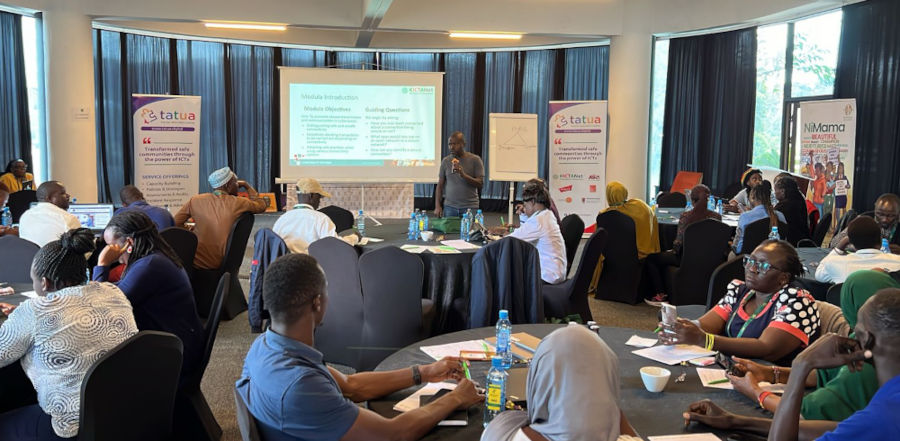The Tatua Digital Resilience Centre, in collaboration with KICTANet and Defenders Coalition, organized a three-day training for 120 human rights defenders from across the 47 counties of Kenya. The training, which took place in Nairobi between December 5-7, 2023, at The Holiday Inn Hotel, Two Rivers, was part of the 2023 Human Rights Defenders (HRD) Academy. This initiative aimed to address the deficiencies identified by HRDs during the previous year’s HRD General Assembly.
The Tatua Digital Resilience Centre is dedicated to supporting Social Justice Organizations (SJOs) in East Africa to maintain, grow, change, recover, and survive in a changing environment by implementing effective digital strategies. It is part of a wider network of resilience hubs in the region under the Ford Foundation’s Weaving Resilience initiative for Stronger Civil Society in the Global South.
Background.
The National Coalition of Human Rights Defenders Kenya (Defenders Coalition), is a national organization established in 2007 and registered as a trust in Kenya. It is dedicated to safeguarding the safety, security, and overall well-being of human rights defenders (HRDs). The coalition achieves this by enhancing the capacities of HRDs for more effective work and advocating for supportive legal, policy, and institutional frameworks to minimize their susceptibility to persecution or harm. Additionally, the Defenders Coalition has been organizing the Human Rights Defenders (HRD) Academy annually since 2016, aiming to address the training requirements and other deficiencies identified by HRDs during the previous year’s HRD General Assembly.
Participant’s Interaction.
The Tatua Digital Resilience Centre, in collaboration with KICTANet and Defenders Coalition, organized a three-day training session for 120 human rights defenders from all 47 counties in Kenya. The training combined theoretical and practical sessions, and a prior needs assessment survey revealed that 76% of the attendees had not received similar training before. During the sessions, the attendees actively participated and shared how they use digital devices to advance their cause. They also shared the challenges they experienced while operating online, including social engineering attacks, harassment, misinformation, identity theft, targeted attacks, censorship, profiling, and surveillance.
The training covered the following thematic areas, where the trainees acquired new skills and knowledge:
- Cyber Hygiene Practices: This included reducing risks to personal devices through software updates, identifying trustworthy software, installing anti-malware protection, managing app permissions, encryption, and data backup.
- Configuring Device and App Authentication: This involved good password practices, biometrics, password managers, and multifactor authentication.
- Identifying and Reporting Social Media Threats: Trainees learned to recognize and report threats such as misinformation, identity theft, social engineering, and cyberbullying.
- Identifying and Responding to Social Engineering Strategies: This focused on understanding and responding to social engineering tactics.
- Identifying and Using Secure Connections: Trainees learned about WiFi security, secure websites, disabling unused networks, VPN setup, and verifying scam websites.
- Keeping Digital Money Safe: This involved understanding and implementing practices to keep digital money secure.
The training included an active discussion on various tools that human rights defenders (HRDs) can utilize to enhance their digital security. Additionally, the attendees received extra technical support after the training, which involved assistance in configuring free, open-source security tools and device maintenance.
Post-session surveys indicated that the training was well-received, with the audience expressing a need for more comprehensive training, particularly focusing on advanced technical skills. In summary, the training was successful and highlighted a growing demand for capacity building in cyber hygiene among human rights defenders, especially in light of the increasing prevalence of digital risks and the emergence of data privacy laws impacting their work.
The thematic areas covered in the training aimed to equip the participants with the necessary skills and knowledge to navigate the digital landscape securely and protect themselves from various online threats. The training’s success underscores the increasing importance of cyber hygiene capacity building for human rights defenders, given the proliferation of digital risks and the evolving regulatory landscape impacting their work.

